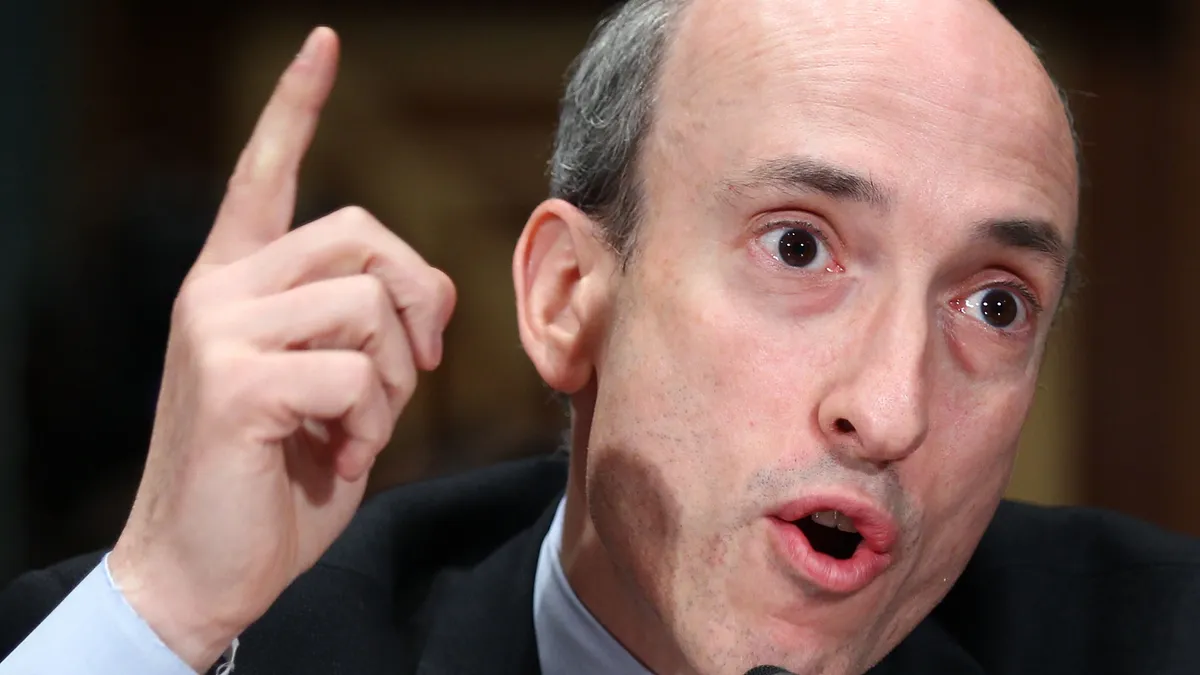Dive Brief:
- Two leading Republican lawmakers have told top Biden administration financial regulators not to subject U.S. companies to tough EU mandates for climate risk disclosure, saying the rules would harm U.S. capital markets and energy and agriculture sectors.
- Sen. Tim Scott of South Carolina, the senior Republican on the Senate Banking Committee, and Rep. James Comer of Kentucky, chairman of the House Oversight Committee, allege that administration officials, after facing opposition to their proposed rules for carbon emissions disclosure, aim to impose on U.S. businesses stricter regulations already mandated by the EU.
- “We are deeply concerned that U.S. agencies under the Biden administration are either passively allowing a foreign body to regulate American companies or are willfully circumventing the U.S regulatory process by actively coordinating with foreign governments to dictate climate and economic policy to U.S. companies,” the lawmakers said in a June 5 letter to Securities and Exchange Commission Chair Gary Gensler. They made a similar allegation in a letter to Treasury Secretary Janet Yellen.
Dive Insight:
GOP lawmakers and business associations, including the U.S. Chamber of Commerce, have vilified a rule proposed by Gensler in March 2022 that would require publicly traded companies to disclose in detail their carbon emissions and risks from climate change.
The opponents say the SEC is exceeding its authority and would require companies to disclose, at high cost, business details that are immaterial to investment decisions.
The SEC has twice delayed release of its final rule while poring over 14,000 public comments on its 490-page document.
Meanwhile, the EU has taken steps to enforce standards for environmental, social and governance best practices. It released “a due diligence directive” in December mandating that large companies determine the “actual and potential adverse impacts on human rights and the environment” from their operations, as well as those of subsidiaries and business partners.
The directive details penalties, and establishes civil liability, for violations and requires that companies adopt a plan for compliance with the Paris Agreement to achieve net-zero greenhouse gas emissions by 2050.
Scott and Comer suggest that the Biden administration is attempting to sidestep opposition to climate risk disclosure in the U.S. by piggy-backing on EU regulations.
“It is deeply troubling that Treasury is facilitating efforts by the EU that would significantly harm American businesses and the U.S. financial system, instead of offering robust resistance to such initiatives and providing zealous advocacy for the American economy,” the lawmakers said in their letter to Yellen.
“Shifting to an EU-style climate regulatory regime in the U.S. would materially and unnecessarily harm our nation’s oil and gas sector, agriculture sector and our preeminent capital markets,” Scott and Comer said.
The U.S.-EU Financial Regulatory Forum in recent years has regularly shared views on topics including “sustainable finance and climate-related financial risks.” It met most recently in February.
Gensler has backed efforts by regulators to develop consistent standards for climate change disclosure, saying that clear, uniform disclosures on the costs from climate change will benefit both businesses and investors.
Businesses will gain detailed insights into potential costs and opportunities, while investors will be able to better gauge risks at specific companies and compare risk levels across industries, according to Gensler.
“If it’s consistent and comparable, it helps both issuers and investors and can lower the cost of the risk premium, and risk premium is part of the cost of capital,” Gensler told a Harvard University forum on Sept 15.
When crafting the rules, the U.S., EU and other jurisdictions have used as a starting point a framework created by Task Force on Climate-related Financial Disclosures, he said. “We’re all trying to build off that.”
If a SEC climate risk regulation does not take force, then U.S. companies would need to follow rules from jurisdictions abroad, Gensler said.
“If we don’t finalize something for whatever reason, or if the courts stay it,” Gensler said, “then our issuer base, especially the larger companies, are probably going to have to comply with rules of the road that are based on other authorities and even other political systems.”












